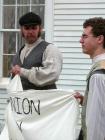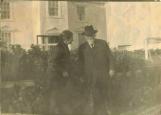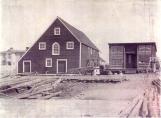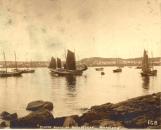14
In 1867 the Colonies in British North America began to join together in a confederation to form the country of Canada. In 1869 an election was held in Newfoundland to decide if the colony would become part of Canada. Candidates ran as either confederates or anticonfederates.15
Performers portraying Anticonfederates in a re-enactment of the 1869 election.1 July 2003
Mockbeggar Plantation, Provincial Historic Site, Bonavista, Newfoundland

16
The St. John's Merchants, like their predecessors the West Country Merchants, feared that a change in government would threaten the monopoly they held on the Newfoundland fishery. They played on the emotions of common Newfoundlanders appealing to their sense of independence and national pride.The confederate candidate in Bonavista Bay was Mr. Carroll. During his campaign, he visited Kings Cove, a community just outside Bonavista. The people of Kings Cove were fiercely anti confederate. While he was making a speech someone crept up behind him and cut off his coat tail with a sharp sheath knife. The crowd turned ugly and Mr. Carroll was forced to take refuge in the house of Mr. John Hartley. The crowd surrounded the house and tried to force the door. A window was broken. The crowd kept watch on the house until Mr. Carroll made his escape that night under cover of darkness. He slipped out of the house and under a flake that stretched from the house to the landwash.
17
Performers portraying disappointed Confederates in a re-enactment of the 1869 election.1 July 2003
Mockbeggar Plantation, Provincial Historic Site, Bonavista, Newfoundland

18
The incident at Kings Cove, though not typical, reflects the general feeling in the colony at that time. The confederates were soundly defeated. Newfoundland became the only colony in British North America to opt for independence. The Saints at Mockbeggar as well as the majority of people in Bonavista were supporters of Confederation. James Saint said that the campaign was lost because the people "had been led astray." Confederation would become a dirty word in politics. The idea would not be considered again for another 30 years.20
Hurrah for our own native isle, Newfoundland!Not a stranger shall hold one inch of its strand!
Her face turns to Britain, her back to the Gulf,
Come near at your peril, Canadian Wolf!
Ye brave Newfoundlanders who plough the salt sea,
With hearts like the eagle so bold and so free;
The time is at hand when you'll all have to say,
If Confederation will carry the day.
Cheap tea and molasses they say they will give,
All taxes take off that the poor man may live;
Cheap nails and cheap lumber our coffins to make,
And homespun to mend our old clothes when they break.
If they take off the taxes how then will they meet,
The heavy expense of the country's up-keep?
Just give them the chance to get us in the scrape,
And they'll chain us as slaves with pen, ink, and red tape.
Would you barter the right that your fathers have won,
Your freedom transmitted from father to son?
For a few thousand dollars of Canadian gold,
Don't let it be said that your birthright was sold.
(Anticonfederate song ca. 1869)
21
The Ropers in Front of Their Home on the Mockbeggar Plantation.1923
Mockbeggar Plantation, Bonavista, Newfoundland

22
In the early 20th century the Mockbeggar Plantation came under the ownership of the Ropers.24
John Roper was a Native of St. John's. When he married Anne Snelgrove from Catalina, her father financed the purchase of the Mockbeggar Plantation. Their daughter Ethel Louise Roper would marry F. Gordon Bradley, who became the leader of the Confederation movement in the late 1940's.There had been economic difficulties in Newfoundland around the turn of the century and the country had flirted with the idea of confederation again, but Canada did not have much to offer Newfoundland at that time. With no reason to give up its sovereignty, Newfoundland continued on through the cycles of good times and bad as it had for generation upon generation.
It should be noted here that John Roper was a confederate.
25
Big Store and Barter Shop on the Mockbeggar Plantation, during the time of John Roper.1900
Mockbeggar Plantation, Bonavista, Newfoundland



